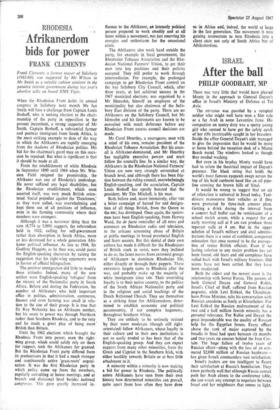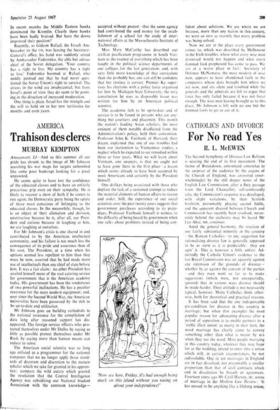After the ball
ISRAEL PHILIP GOODHART, MP
There was very little that would have pleased Monty in the approach to General Dayan's office in Israel's Ministry of Defence at Tel Aviv.
The entrance was guarded by a rumpled soldier who might well have won a film role as a fat Arab in some Levantine farce. His companion on sentry duty was a spotty young girl who seemed to have got the safety catch of her rifle inextricably caught in her brassiere. Inside the office General Dayan's aide managed to give the impression that be would be more at home behind the reception desk of a Miami Beach motel. The windows looked as though they needed washing.
But even in his heyday Monty would have had to salute the theatrical impact of Dayan's presence. The black string that holds the world's most famous eyepatch swept across the top of his bald sunburnt head like an oil pipe- line crossing the brown hills of Sinai.
It would be wrong to suggest that an air of relaxation is universal in Israel today. Taxi- drivers manoeuvre their vehicles as if they were protected by three-inch armour plate. Getting a drink during the interval from a concert hall buffet can be reminiscent of a school match scrum, while a request for an early morning call at 6 am can produce three separate calls at 4 am. But in the upper echelon of Israel's military and civil adminis- trations there is a sense of confident, competent relaxation that once seemed to be the preroga- tive of senior British officials. Even if no lasting solution to any major problem has yet been found, old fears and old complexes have rolled back with Israel's military frontiers. Old scores have not been settled. But they ha% e been readjusted.
Both the oldest and the newest score is the relationship with Soviet Russia. The parents of both General Dayan and General Rabin, Israel's Chief of Staff, suffered from Russian pogroms, while Levi Eshkol, the Ukrainian- born Prime Minister, salts his conversation with Russian anecdotes as freely as Khrushchev. For Levi Eshkol the Russian maltreatment of the two and a half million Jewish minority has a personal relevance. For Rabin and Dayan the great imponderable was the quality of Russian help for the Egyptian forces. Every officer above the rank of major captured by the Israelis in Sinai had spent between six months and two years on courses behind the Iron Cur- tain. The huge failure of twelve years of Russian effort—along with the loss of an esti- mated $2,000 million of Russian hardware-- has given Israeli commanders vast satisfaction.
Israel's leaders are too intelligent to flaunt their satisfaction at Russia's humiliation. They know perfectly well that although Russia cannot push her Arab clients to the conference table, she can wreck any attempt to negotiate between Israel and her neighbours that comes to light
In recent months the Middle Eastern hawks dominated the Kremlin. Clearly these hawks have been badly bruised. But have the doves improved their position?
Recently, as Gideon Rafael, the Israeli Am- bassador to the UN, was leaving the Secretary- General's office, his hand was suddenly seized by Ambassador Federenko, the able but odious chief of the Soviet delegation. 'Your country has a right to live. My country has a right to live,' Federenko boomed at Rafael, who mildly pointed out that he had never ques- tioned the Soviet Union's right to survival. The straws in the wind are insubstantial; but from Israel's point of view they do seem to be point- ing in the direction of increased moderation.
One thing is plain. Israel has the strength and the will to hold on to her new territories for months and even years.































 Previous page
Previous page